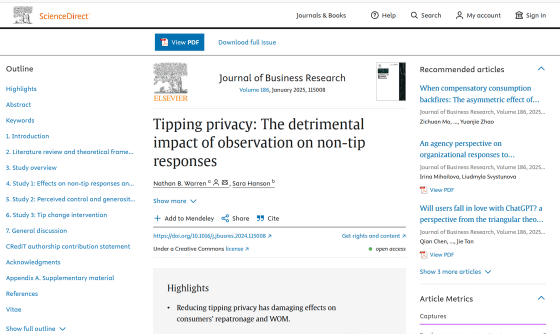If customers feel that their tipping at payment terminals is being 'monitored,' it could have a negative impact on business.

In some countries, such as the United States, it is customary to pay
Tipping privacy: The impairment impact of observation on non-tip responses - ScienceDirect
https://www.sciencedirect.com/science/article/pii/S0148296324005125

Tip pressure might work in the moment, but customers are less likely to return
https://theconversation.com/tip-pressure-might-work-in-the-moment-but-customers-are-less-likely-to-return-242089
In recent years, digital payments have become popular in the United States, and digital tip payment systems have also become popular. However, many customers feel that they are being monitored by employees when paying tips, and this monitoring by employees may be an implicit pressure.
Sarah Hanson, an associate professor of marketing at the University of Richmond in the US, and her colleagues analyzed data from over 36,000 digital payment transactions conducted in real stores, as well as data from a test conducted on over 1,100 subjects in total. In the series of studies, they compared paying tips using a digital payment terminal that employees could see (low privacy) with paying tips using a payment terminal that employees could not see (high privacy).
For example, the countertop terminal on the left in the image below is a high-privacy terminal because the screen faces away from the employee, while the handheld terminal on the right is a low-privacy terminal because the device itself is closer to the employee and the screen is easily visible.

The analysis revealed that customers who used low-privacy payment terminals were significantly less likely to return to the store than those who used high-privacy payment terminals, and were also less likely to recommend the store to others.
'Privacy made customers more tolerant and more likely to feel in control of their decisions, whereas feeling surveilled made them resentful and less loyal,' the researchers wrote.
Previous

Digital tipping systems are convenient, but in recent years they have become a source of stress for consumers, with the term ' tipflation ' emerging to address the issue of rising expectations of stores to pay tips.
'It's crucial for businesses to strike the right balance between giving customers control over their tips and allowing them to be generous,' the research team said. 'Businesses that educate their employees to respect the privacy of customers' tips, pay them appropriately, and avoid putting pressure on customers in the first place will likely build better reputations and a more loyal customer base.'
Related Posts:
in Science, Posted by log1h_ik







